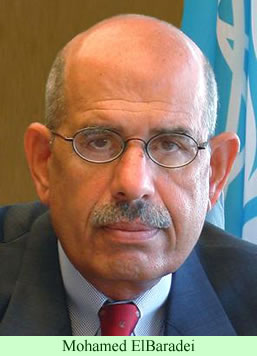This past week, Nubians expressed many different points of view about their hopes for the future, including whether or not they necessarily want to resettle along the banks of the Nile in southern Egypt. But at least their opinions are, at times, being considered. At other times they are still ignored.

Early in the week, the internationally known diplomat Mohamed ElBaradei said that he will be focusing on the Nubians soon, when he begins campaigning for president. The former Director General of the International Atomic Energy Agency and winner of the Nobel Peace Prize in 2005, ElBaradei told a meeting of young activists that the demands of the Egyptian Revolution of January had not yet been met. He specified that when the campaigning begins for a new President of Egypt, he plans to focus on marginalized peoples, such as the Bedouins and the Nubians.
Later in the week, another news report indicated that the ruling cabinet had decided to grant lands to Nubians in the Toshka Project of Southwestern Egypt. Some Nubians felt the decision was a victory, while others decried it as a betrayal.
The Toshka Project is a massive water diversion scheme in Southern Egypt. A huge water pumping facility, named, not surprisingly, the Mubarak Pumping Station, was completed in 2005 on Lake Nasser, the reservoir created by the massive Aswan High Dam. The pumps move over a million cubic meters of water per hour into a canal system designed to transport it to the west and north into vast reaches of desert.
According to one enthusiastic civil engineering website, the project will reclaim a half million acres of desert. It was named “one of the five most outstanding civil engineering achievements of the year” by the American Society of Civil Engineers. By 2020, when the project is scheduled to be completed, the newly watered desert will be able to house over three million inhabitants and will increase the arable land in the country by 10 percent.
Haggag Addoul, the well known Egyptian writer and frequent spokesperson for Nubian rights, quickly said that the decision did not recognize their demands to be allowed to resettle on the banks of Lake Nasser south of Aswan, near their ancestral homeland which was flooded by the High Dam.
Manal al-Teeby, a Nubian activist, also said the decision was ill advised. It was worse than the decisions of the former Mubarak regime toward the Nubians, she believes. She decried Prime Minister Essam Sharaf for not consulting with the Nubians before issuing the decision, and urged a public debate on the matter.
However, Mossad Herky, President of the Nubian Club, was in favor of the decision. He believes that there is a need to resolve the Nubian land issues. and the current government is moving in the right direction.
Mounir Bashir, Chairman of the Egyptian Nubian Association for Law, argued that the cabinet decision is oriented at driving a wedge between Nubians exiled from their lands by earlier, smaller Aswan dams, such as the one in 1933, and the last, and most massive, dislocation of 1964. Some of those 1964 refugees from Old Nubia still want to return to the Nile.
Omar al-Sharif, from the Aswan Local Center, welcomed the cabinet decision. He said the center had been pressing for such a solution to the Nubian claims for 12 years.